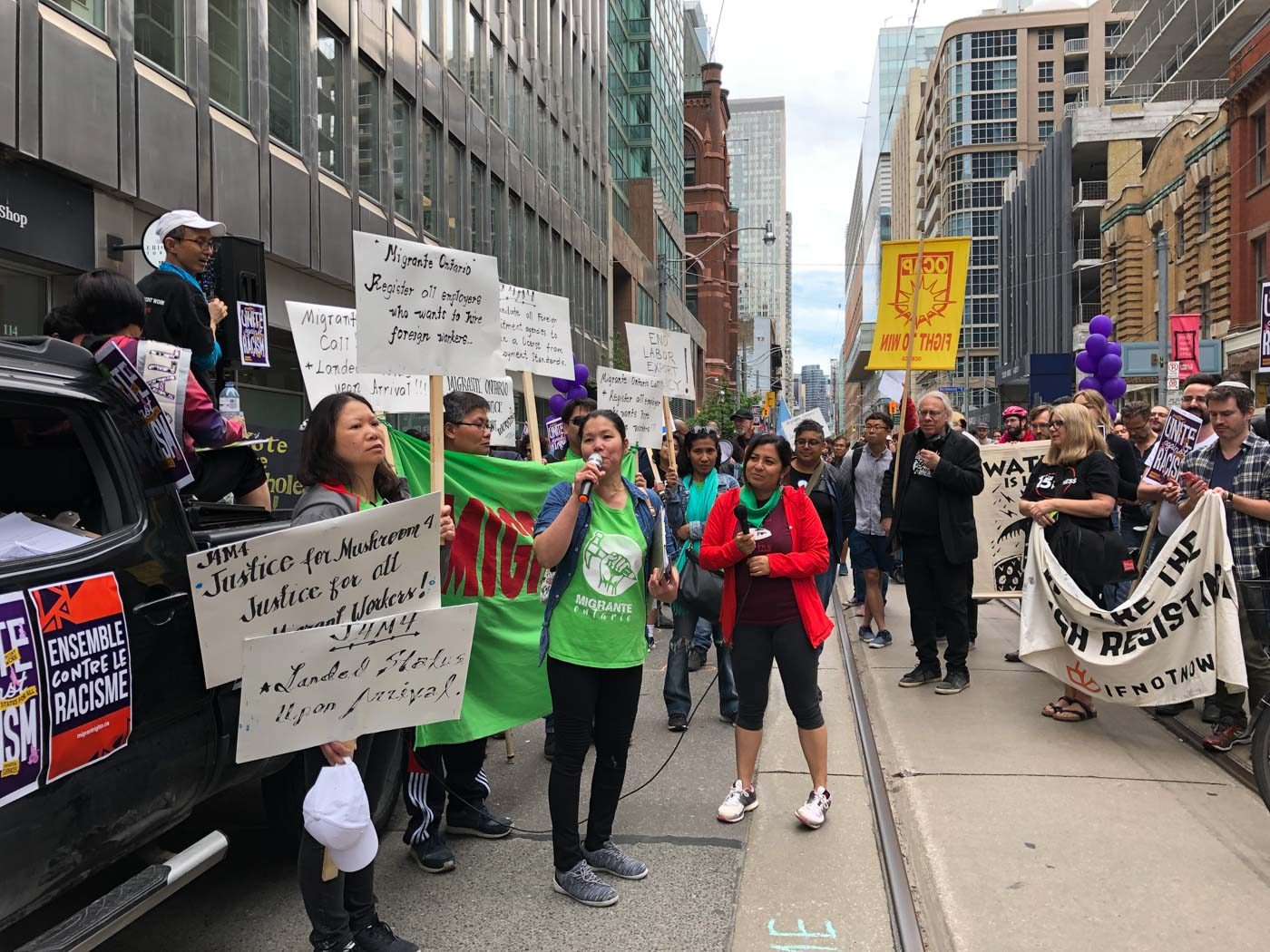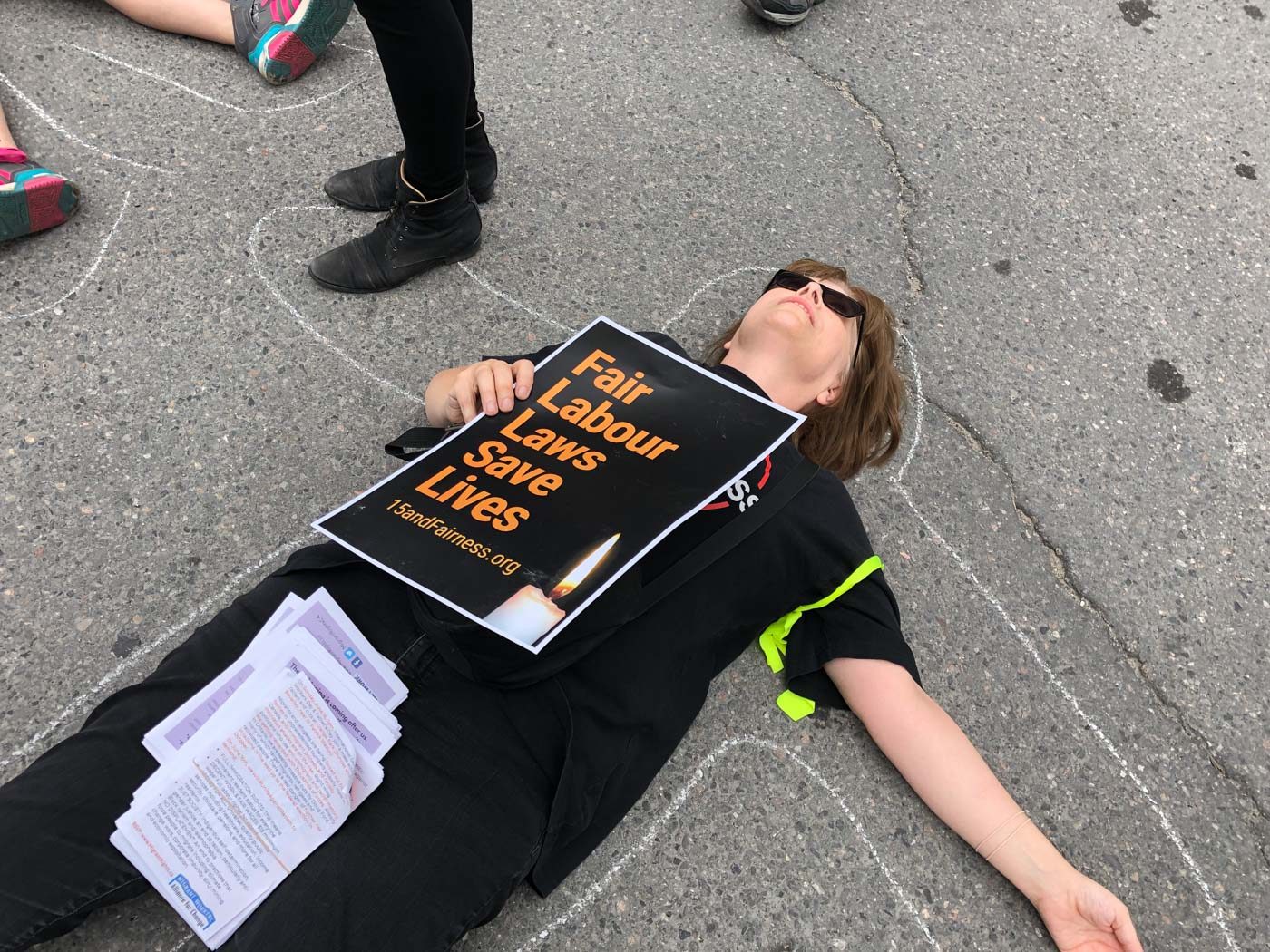SUMMARY
This is AI generated summarization, which may have errors. For context, always refer to the full article.

TORONTO, Canada – Filipino farm workers and care workers marched with hundreds of other temporary foreign workers (TFW) in this city’s downtown core Sunday, June 16, to call for decent work, permanent resident status upon arrival, universal services, and an end to discrimination and displacement of migrant workers.
Canadian anti-racism activists also joined the protest action organized by the Migrant Rights Network and the Migrant Workers Alliance for Change on the occasion of International Domestic Worker Day and Father’s Day. Similar protest actions were held in 11 cities across Canada, including Winnipeg, Vancouver, Halifax, and Ottawa.
Chanting “Stop deporting people – no one is illegal” and “Immigrants and refugees are welcome here,” marchers wended their way from Grange Park to University Avenue, where the Ontario Ministry of Labour office is located, before ending at the Immigration and Refugee Board headquarters on Victoria Street.
Protesters, who carried “Unite Against Racism” banners and placards as well as purple balloons, staged a “die-in” on University Avenue to demonstrate the precarious nature of migrant work and the deaths that occur in unsafe job sites.
Filipina caregivers – whose decades of activism led to new pilot programs that will grant them more work mobility, allow them to bring their families to Canada, and provide a pathway to permanent residency after two years – led the march.
Behind them were members of the Migrante Ontario, a Filipino NGO fighting for migrant workers, and 4 Filipino farm workers, collectively known as “Mushroom 4,” who recently filed a case against their recruiter and employer, who they allege exploited them.
Marisol Veridiano Bobadilla, Maila Ceguerra, Jesse Veneranda, and Lourdes de la Pena have alleged that Filipino recruitment agency Link4staff, based in Vaughan, Ontario, charged them “immigration services” in exchange for work permits that never materialized. Collectively, these fees, which were automatically deducted from their paychecks, amounted to more than 82,000 Canadian dollars.
Not only did they not earn decent wages and work long hours, the worst part was that they lost their status as TFWs, said Bobadilla.

Mushroom 4
In an interview, Bobadilla said she came to Canada in 2014 to work as a TFW in a fish farm in Prince Edward Island. Since the job was only seasonal, she searched for full-time work and came across Link4staff, which promised her a job as a caregiver in Ontario. Upon arrival, however, she was told picking mushrooms was the only job available.
“Unang araw pa lang, hindi ko ginusto at kahit sinong tao ‘di gugustuhin ito (Even on the first day, I never liked the job and no person would want it either),” Bobadilla said, holding back tears.
She said she picked mushrooms from 5 am to 11 pm, and at times, had to go back to work again at 3 am.
“Ang pamimitas ng mushroom, hindi ka babayaran per oras. Per box. Depende kung gaano ka kabilis o gaano ka kabagal. (When picking mushrooms, you’re not paid by the hour, but per box. It depends how fast or how slow you work).”
The hardest part, however, was harvesting mushrooms located 30 feet high. She said she would be on a trolley with only a harness to protect her as she picked mushrooms using a knife. She toiled there from December 2014 until August 2017, when she decided she had had enough and contacted Migrante Ontario.
She convinced the 3 other Filipinos to join her in fighting for their rights. Bobadilla, who hails from Laguna, hasn’t seen her 3 children ages 24, 20, and 13, for almost 5 years now. Like many other Filipinos, she said, she left in order to support them and to give them a bright future.
She said she hopes her struggles have not been for naught. “Nagsisisi ako na umalis ako sa PEI dahil ‘yung mga kasamahan ko doon naging PR na. (I regret having left PEI because the ones I worked with there are now permanent residents).”
About one and a half years ago, with the help of Migrante Ontario and pro bono lawyers, the “Mushroom 4” applied for immigrant status under humanitarian and compassionate grounds.
While waiting for the government’s response, they have been busy campaigning for recruitment agencies and employers to be registered officially by provincial governments so they can be monitored, and for all migrant workers to receive landed status upon arrival.
Under Canada’s current immigration policy, over two-thirds of migrants who arrive each year or about 750,000 do not have access to healthcare, education, income support, and labor support because of their temporary status. And yet, noted the Migrant Rights Network, these TFWs pay municipal, sales, and income taxes.
Xavier Carmona, a migrant farm worker from Mexico, has worked in Canada for 17 years.
“After all these years of working in Canada, I still have no right to bring my family here. That means missing many special moments like my children’s first steps, graduation, or Father’s Day like today,” he said.
“We are human beings, we deserve decent work, services, and permanent status.”
The backbreaking work of being a fruit picker has taken a toll on his health, said Carmona. He suffered hernia from working in the strawberry fields and has been diagnosed with carpal tunnel from pruning grape vines over extended periods of time.
In the lead up to the federal elections in October, protesters urged political parties to look into the plight of TFWs “instead of using xenophobia to divide the electorate.”
In a statement, the Migrant Rights Network said that hate crimes have gone up 47%, while a recent survey showed that 42% of Canadians believe there are too many non-white immigrants coming to Canada. It also noted that there are now over 300 active white supremacist organizations in Canada.
“Politicians are at worst blaming migrants to win votes or at best paying lip service while enacting the same anti-migrant policies,” said Syet Hussan of Migrant Workers Alliance for Change. – Rappler.com
Add a comment
How does this make you feel?





There are no comments yet. Add your comment to start the conversation.